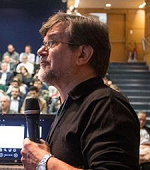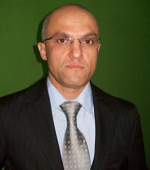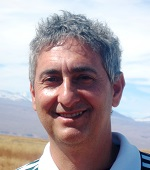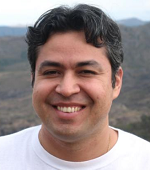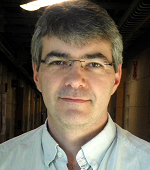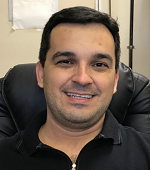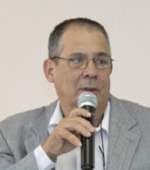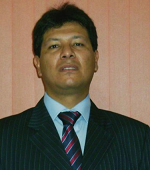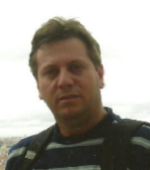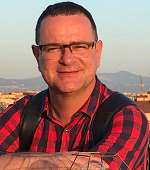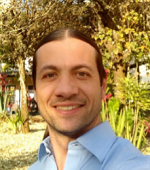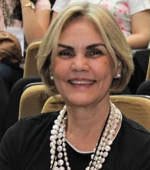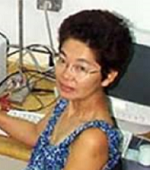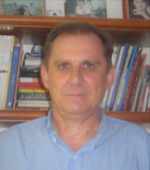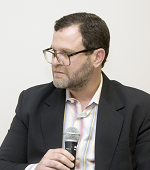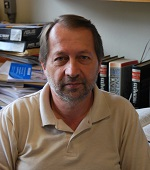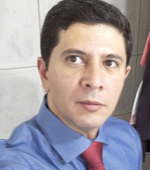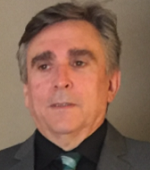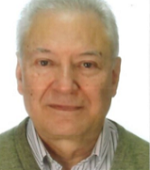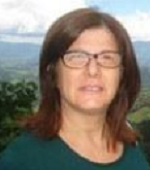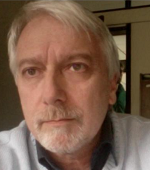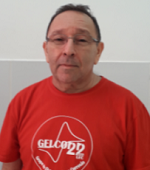Mini-Conferências
Seção 1 / Eletroanalítica e Sensores Eletroquímicos (EASE)
Seção 2 / Eletroquímica Ambiental e Engenharia Eletroquímica (EAEE)
Seção 3 / Eletroquímica de Materiais Nanoestruturados, Processos Eletroquímicos e Interfaces (EMPE)
Seção 4 / Eletroquímica Fundamental, Eletrossíntese e Eletroquímica Orgânica (EFESEO)

Leigh Aldous (King's College - Londres)
Thermoelectrochemistry: Using entropy and electrochemistry to convert waste heat to electricity
The broad research interests of the Aldous group can be summarised by two core areas: Thermoelectrochemistry: Our interest in thermoelectrochemistry is related to the conversion of waste heat into useful energy using redox chemistry. This is an entropy-driven process, and as it relies upon chemistry it has no moving mechanical parts and is highly scalable. We are tailoring our redox chemistry (electrochemistry), electrolyte and electrodes towards having the highest possible efficiency, while also aiming to be as innocuous as possible, with the end goal of developing wearable devices to exploit waste body heat. Biomass utilisation: Biomass is basically trees, grass, agricultural waste and a whole range of other things. Like almost everything else, they are made of chemicals. Our research investigates converting these chemicals into useful energy and some of the chemicals required for modern day quality of life. We combine this with the principles of ‘green chemistry’ or ‘sustainable chemistry’, looking to recycle as much as possible while making the smallest possible impact outside of our process.
Curriculum: [link], Abstract: [Download]
Curriculum: [link], Abstract: [Download]

Mark E. Newton (University of Warwick)
Electrochemical Electron Paramagnetic Resonance (EPR): Instrumentation and Application
Research Interests
My research focuses on three different themes:
1. The extreme properties of diamond mean that it could surpass other wide band gap materials in many optical and electronic applications. Ultimately, the electrical and optical properties will be limited by defects and impurities either grown-in, introduced during processing steps involved in modern device fabrication, or produced via possible degradation processes during device operation. This motivates work on understanding and determining the electronic properties and lattice structures of defects, as well as the diffusion of impurities and activation of dopants in diamond. The group uses a wide range of spectroscopic and microscopic techniques to study, engineer and exploit defects in diamond. See go.warwick.ac.uk/diamond.
2. The development of new technologies, techniques and methodologies for Electron Paramagnetic Resonance (EPR), Dynamic Nuclear Polarisation (DNP) and optical spectroscopies. Advances in instrumentation provide the competitive edge and underly almost everything that goes on in experimental science. See go.warwick.ac.uk/DNP.
3. Boron doped diamond (BDD) is presently the subject of considerable interest as an electrode material. This is a consequence of its very wide potential window in aqueous solution, low background currents, and corrosion stability in aggressive media. In collaboration with the Warwick Electrochemistry and Interfaces Group, we are investigating the electrical and electrochemical properties of single crystal and polycrystalline BDD and developing diamond based sensor technologies. See www.warwick.ac.uk/electrochemistry.
I am also Director of the Centre for Doctoral Training (CDT) in Integrated Magnetic Resonance (iMR) which involves internationally-leading researchers at the Universities of Warwick, St Andrews/Dundee, Southampton, Nottingham and Aberdeen as well as all the major industrial magnetic resonance companies. m.e.newton@warwick.ac.uk
Abstract: [download]
My research focuses on three different themes:
1. The extreme properties of diamond mean that it could surpass other wide band gap materials in many optical and electronic applications. Ultimately, the electrical and optical properties will be limited by defects and impurities either grown-in, introduced during processing steps involved in modern device fabrication, or produced via possible degradation processes during device operation. This motivates work on understanding and determining the electronic properties and lattice structures of defects, as well as the diffusion of impurities and activation of dopants in diamond. The group uses a wide range of spectroscopic and microscopic techniques to study, engineer and exploit defects in diamond. See go.warwick.ac.uk/diamond.
2. The development of new technologies, techniques and methodologies for Electron Paramagnetic Resonance (EPR), Dynamic Nuclear Polarisation (DNP) and optical spectroscopies. Advances in instrumentation provide the competitive edge and underly almost everything that goes on in experimental science. See go.warwick.ac.uk/DNP.
3. Boron doped diamond (BDD) is presently the subject of considerable interest as an electrode material. This is a consequence of its very wide potential window in aqueous solution, low background currents, and corrosion stability in aggressive media. In collaboration with the Warwick Electrochemistry and Interfaces Group, we are investigating the electrical and electrochemical properties of single crystal and polycrystalline BDD and developing diamond based sensor technologies. See www.warwick.ac.uk/electrochemistry.
I am also Director of the Centre for Doctoral Training (CDT) in Integrated Magnetic Resonance (iMR) which involves internationally-leading researchers at the Universities of Warwick, St Andrews/Dundee, Southampton, Nottingham and Aberdeen as well as all the major industrial magnetic resonance companies. m.e.newton@warwick.ac.uk
Abstract: [download]
Seção 5 / Bioeletroquímica, Biossensores e Bioanalítica (BEBSBA)
Seção 6 / Energia, Baterias Supercapacitores e Células a Combustível (EBSCC)

Iwona Rutkowska (University of Warsaw)
Nanostructured-Metal-Oxide-Supported Noble Metal Nanoparticles for Electrocatalytic Processes of Importance to Fuel Cell Technology
Iwona Rutkowska is a faculty member at the Department of Chemistry, University of Warsaw. Her current research focuses on materials chemistry and electrochemistry, metal oxides, organic and inorganic polymers, electrocatalytic nanostructures including noble metal nanoparticles and functionalized carbons, mechanisms of ion and electron transfer processes in mixed-valence inorganic films. She develop nanomaterials for sustainable conversion and storage of energy. Her research interests involve oxidation of small organic molecule, oxygen reduction reaction and carbon dioxide reduction in acid and alkaline media. She is a member of the Electrochemical Society (Pennington, USA) and International Society of Electrochemistry (Lausanne, Switzerland).
Abstract: [download]
Abstract: [download]

